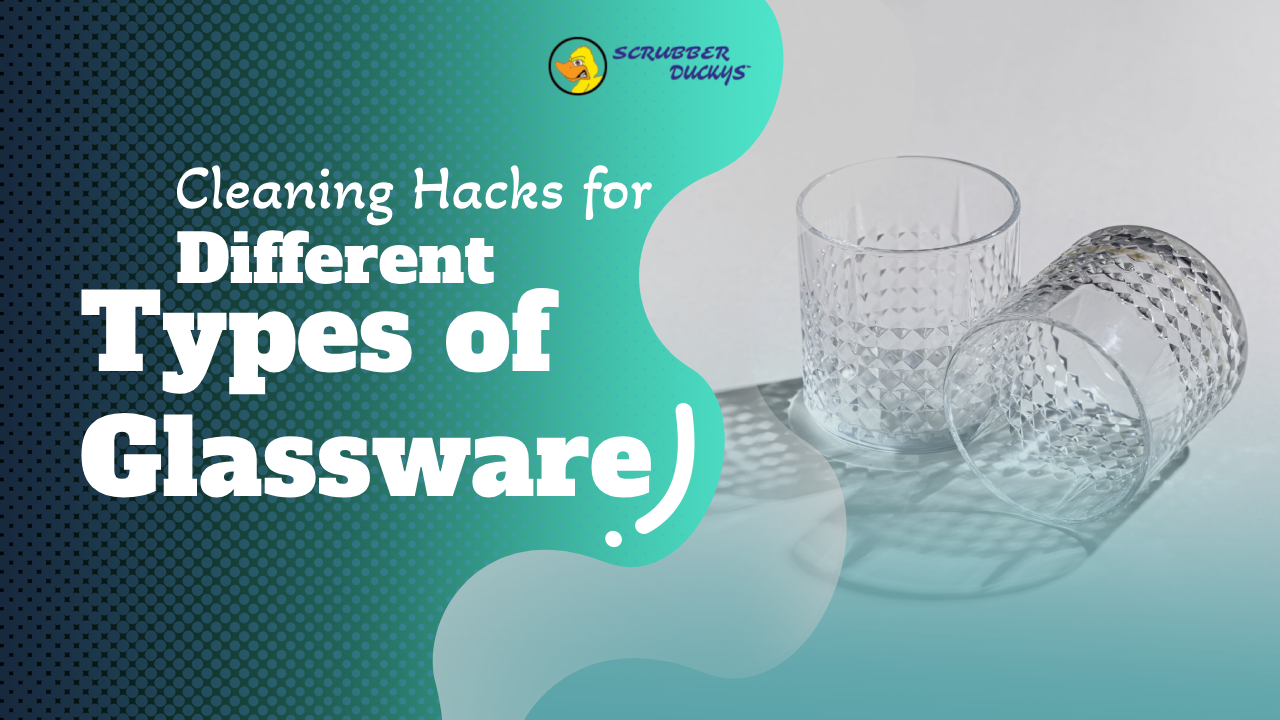Glassware: Staple of Every Home
Glassware is a staple in every household, ranging from drinking glasses and wine goblets to decorative vases and storage jars. Keeping your glassware spotless can feel like a daunting task, especially when dealing with stubborn stains, water spots, or delicate pieces. Fortunately, with the right tips and tricks, you can ensure your glassware remains sparkling clean with minimal effort. In this blog, we’ll dive into the top five cleaning hacks for different types of glassware, ensuring your pieces stay crystal clear.
Keep your glass pieces fresh with our magnetic scrubbers and bong cleaner brushes!
1: Combat Water Spots on Drinking Glasses
Water spots are one of the most common issues with everyday drinking glasses. These unsightly marks often result from mineral deposits left behind when water evaporates. Here’s how to eliminate them effectively:
What You Need: White vinegar, a microfiber cloth, and warm water.
- Fill a basin with equal parts white vinegar and warm water.
- Submerge the glasses for 5-10 minutes.
- Gently scrub using a soft glass scrubber.
- Rinse thoroughly and dry immediately with a microfiber cloth to prevent new spots from forming.
Pro Tip: Hand-drying your glasses instead of air-drying can help prevent future water spots. This method works well not just for kitchen glassware but also for any bong cleaner routines where residue buildup is an issue.
2: Remove Stubborn Stains from Wine Glasses
Wine glasses are notorious for retaining red wine stains, especially along the rim and base. These stains can be challenging to remove without scratching the delicate surface.
What You Need: Baking soda, dish soap, and a soft-bristle brush.
- What You Need: Baking soda, dish soap, and a soft-bristle brush.
- Apply the paste to the stained areas using a soft-bristle brush or glass scrubber.
- Gently scrub in circular motions.
- Rinse thoroughly with lukewarm water and dry with a lint-free towel.
Pro Tip: Avoid using abrasive sponges or cleaners that could scratch the surface. For persistent stains, soak the wine glass in a solution of white vinegar and warm water overnight.
Get pipe cleaning brushes for glass pieces. Mini brushes make cleaning easy.
3: Polish Cloudy Glassware
Over time, glassware can develop a cloudy appearance, often caused by hard water buildup or residue from cleaning products. Here’s how to restore their shine:
What You Need: Lemon juice, salt, and a glass cleaner.
- Cut a lemon in half and dip it in salt.
- Rub the salted lemon over the cloudy areas of the glassware.
- Let it sit for 5 minutes before rinsing with warm water.
- Finish with a spritz of glass cleaner and buff dry with a microfiber cloth.
Pro Tip: Regularly clean your glassware with a mild detergent to prevent buildup and maintain clarity.
Keep your glassware stain free with our best glass cleaner!
4: Handle Delicate Glassware with Care
Fragile items like crystal goblets, antique vases, or etched glass require special care during cleaning to avoid chips or cracks.
What You Need: Lukewarm water, mild detergent, and a soft sponge.
- Fill a sink with lukewarm water and add a few drops of mild detergent.
- Gently wash the glassware using a soft sponge or glass scrubber.
- Rinse under warm running water.
- Place the items on a padded drying rack or dry by hand with a lint-free cloth.
Pro Tip: Always wash delicate glassware individually to prevent accidental collisions.
5: Clean Narrow-Necked Glassware
Cleaning narrow-necked glassware, such as decanters and vases, can be tricky without the right tools. Here’s a clever hack to tackle those hard-to-reach spots:
What You Need: Rice,mini pipe brush, warm water, and dish soap.
- Add a handful of uncooked rice to the glassware.
- Fill the piece halfway with warm water and a few drops of dish soap.
- Cover the opening and swirl vigorously for 1-2 minutes.
- Use a mini pipe brush to clean thoroughly.
Pro Tip: Use specialized brushes for extremely narrow or intricate designs.
Scrubber Duckys: For Spotless Glassware & Bongs
Keeping your glassware and bongs crystal clear doesn’t have to be a challenge. With Scrubber Duckys’ innovative cleaning solutions, you can easily remove stains, residue, and buildup, ensuring a fresh and spotless experience every time. Whether you’re dealing with everyday glassware or looking for an effective cleaner for bong, having the right tools makes all the difference.
Our magnetic scrubbers and specialized brushes reach even the toughest spots, making cleaning effortless. Pair them with our trusted cleaning techniques to keep your glassware in top condition.
FAQ's
Can I use regular dish soap for all types of glassware?
Yes, regular dish soap works for most types of glassware. However, for delicate or antique pieces, opt for a mild, pH-balanced detergent to avoid potential damage.
How often should I clean my decorative glassware?
Decorative glassware should be cleaned every few months or as needed. Dust and grime can accumulate over time, so periodic cleaning helps maintain their aesthetic appeal.
Are commercial glass cleaners safe for all glassware?
Commercial glass cleaners are generally safe but should be used sparingly on delicate or decorative glassware. Always check the product label and test on a small area if unsure.
How do I prevent scratches on my glassware?
Avoid using abrasive cleaning tools or harsh chemicals. Stick to soft sponges, microfiber cloths, and non-abrasive cleaning solutions.
Is it safe to put glassware in the dishwasher?
While many types of glassware are dishwasher-safe, delicate items like crystal goblets or etched glass should always be washed by hand to prevent damage.
What’s the best way to store glassware after cleaning?
Ensure glassware is completely dry before storing. Place items upright on a sturdy shelf and use shelf liners to prevent scratches.
Can I use natural cleaners for glassware?
Absolutely! Ingredients like white vinegar, baking soda, and lemon are effective natural cleaners that are safe for most types of glassware.



